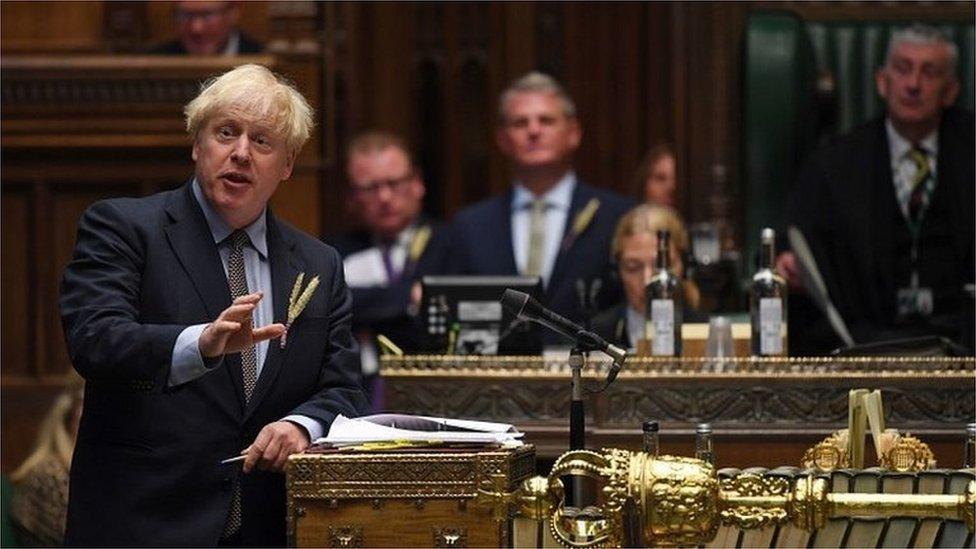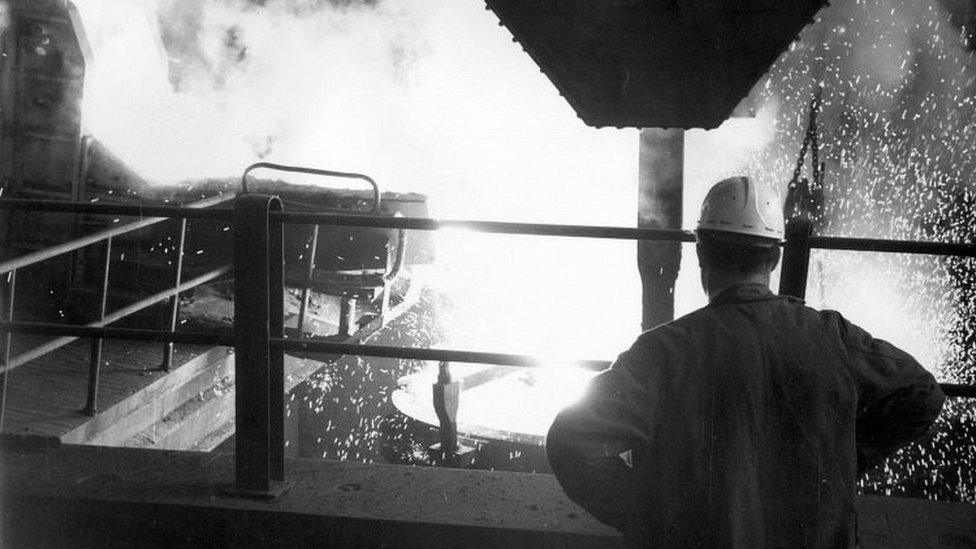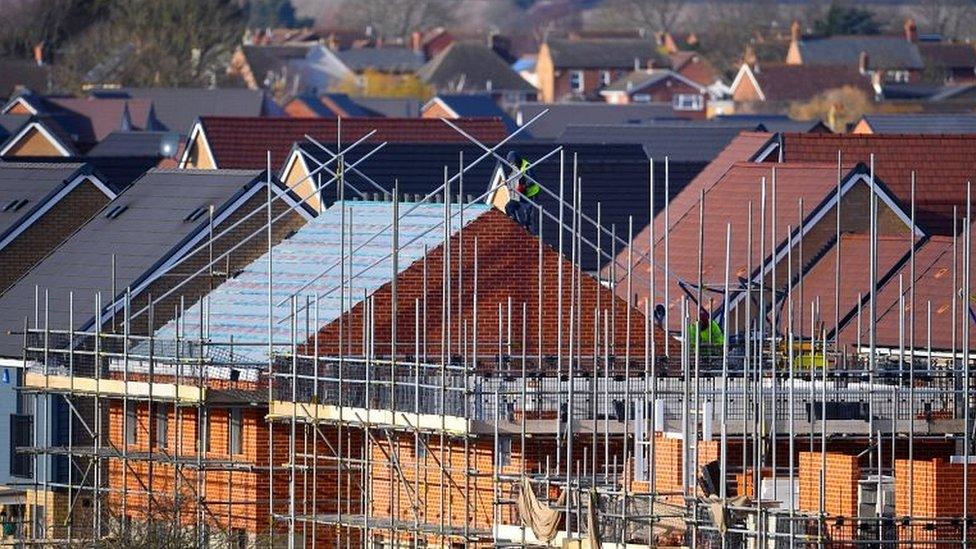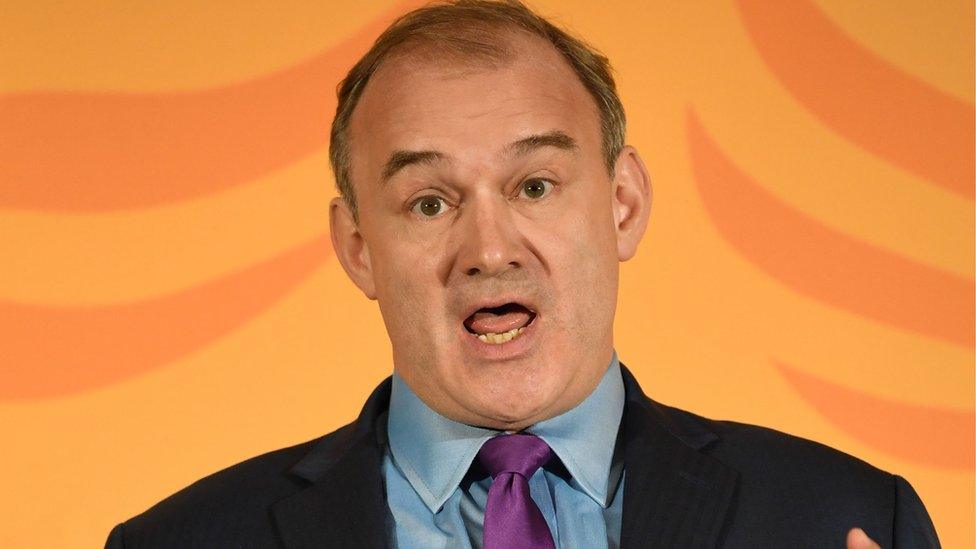The week ahead in Parliament
- Published

The agenda is dominated by the UK Internal Markets Bill with a Second Reading debate and two Committee Stage days in the Commons (and two more to come, the following week), plus a gathering storm over the bill in the Lords.
There is already furious controversy over Part 5, which gives ministers powers to disapply or modify the rules put into law just months ago in the EU Withdrawal Agreement, on the movement of goods from Northern Ireland to Great Britain, and rules relating to state aid, that would come into force if the UK and EU are unable to reach an alternative agreement.
The bill explicitly states that these powers should apply even if they are incompatible with international law.
There's been speculation about how this bill could be handled. First, the Speaker does not have any "line item veto" which would allow him to forbid the inclusion of clauses which would allow ministers to break international law.
Second, this is not a "money bill" and so it is susceptible to being amended in the House of Lords - and any attempt to smuggle the same powers into law via some future money bill could constitute "tacking," the parliamentary sin of attaching non-money matters onto a money bill - and that could invite the House of Lords to pick a fight.
So the bill is capable of being amended by its critics (and there are Brexiteers who want to toughen it up, as well as those - including but not limited to Remainers - who want to water it down). All told, it will have five days on the floor of the Commons, with the Second Reading debate on Monday and four further days for Committee and subsequent stages of debate, concluding on 22 September.
So there will be plenty of opportunity for attempts to make changes - and what looks very like the key amendment is already down from Sir Bob Neill, the Conservative ex-minister who flushed out the point about a "specific and limited" breach of international law, with his question to the Northern Ireland Secretary on Tuesday.
Rebel whipping?
It would require approval from MPs before the government can use the three clauses that have caused the row (on exit procedures for goods, the Northern Ireland Protocol and disapplying international law). The amendment is also signed by Damian Green, the former de facto deputy to Theresa May, and by Oliver Heald, a former solicitor-general.
That sort of tactic was a regular feature of the previous parliament, but the network of Remainer Tories who tied the government in knots before the election is mostly gone. So is Sir Bob about to don the mantle of the departed Dominic Grieve and muster the opposition parties behind a rebel Tory amendment?
On the current schedule that amendment and the whole issue of the bill's handling of Northern Ireland looks set to be debated on Monday 21 September, but the votes look set to come at the end of the Committee Stage the following day, so we'll find out then.
Faced with a large Conservative majority, a rebel whipping operation would be needed to generate a surprising level of Tory rebellion for him to succeed, but it no longer looks impossible for that to happen - senior Tories are pretty unhappy, and may now be prepared to go beyond signalling their disquiet by abstaining.
The PM has already been moved to conduct a Zoom briefing to shore up his parliamentary troops, and it's hard to imagine the subject won't come up when he appears before the Commons Liaison Committee on Wednesday.
Other amendments published at the time of writing are the Lib Dem Alistair Carmichael's, deleting the controversial clauses, and Ed Miliband's, limiting powers to override measures involving common frameworks.
There is also a threat from the other flank, with the Brexiteer European Research Group suggesting it might push amendments for a more complete rejection of the Northern Ireland Protocol.
Strike-down attempt?
Watch out, too, for the devolution implications. The SNP opposes the Bill, so it won't get a legislative consent motion from the Scottish Parliament. The First Minister of Wales, Mark Drakeford has dismissed it as "a power grab" and trouble looms in Northern Ireland.
And that may mean further attempts to stop the bill at Third Reading - always assuming the programming leaves any time for that to happen.
Beyond that, lurk Their Lordships, and the prospect that the massed ranks of Tory dissidents, Crossbench superlawyers and the opposition parties will attempt to amend the key section of the bill, and send it back to the Commons for a bout of parliamentary ping-pong.
There is talk of an attempt to strike down the bill altogether. The argument is that the normal rules about not killing government bills promised in their election manifesto can be turned on their head, because this bill erodes the Withdrawal Agreement which was the keystone of the Conservatives' Brexit promise to the voters.
I'm not sure enough peers would be prepared to buy that and set a collision course with ministers - but there does appear to be a critical mass behind any move to fillet out the offending parts of the bill.
Anyone who watched the Private Notice Question on the bill in the Lords on Thursday will be in no doubt about the level of concern. The intervention of former Tory Leader Michael Howard was eye-catching, but equally ominous was that of Lord Judge, the former Lord Chief Justice, now convener of the crossbench peers.
If the Lords do rewrite the bill and send it back to the Commons, ministers could see a further test of their usually comfortable majority - and remember, even if they win, there will be a price to pay in sore consciences, bruised egos and twisted arms
Elsewhere, the Lords have arrived at the crucial Report Stage consideration of the Agriculture Bill, where the opposition and rebel Conservatives are co-operating on three key issues and look set to force votes on trade standards (perhaps not until the following week), climate change and the National Food Strategy.
And there may well be further votes forced by individual backbenchers who were active in the Committee Stage debates, like the former NFU Chair, Lord Curry, on the Trade and Agriculture Standards Commission.
Blink and you might miss it, but the biggest bill currently before Parliament may well whizz through the Commons without touching the sides - the Sentencing Consolidation Bill is a massive tidying-up of the current morass of sentencing legislation, which is handled by special procedures which mean there is no debate at all in the Commons.
The whole thing is handled by a Consolidation Bill Committee and then rubber stamped with minimal involvement of MPs. Its passage through the Commons will happen with the reading out of a few procedural incantations, and - hey presto! - a major change in the law will be accomplished.
Here's my rundown of the week.
Monday 14 September
The Commons opens (14:30) with an hour of Work and Pensions Questions, to be followed, no doubt, by the usual crop of post-weekend ministerial statements and urgent questions.
This week the Speaker assured MPs that, after discussions with the Health Secretary, Matt Hancock, over his failure to mention the new 6-person limit on gatherings, during his appearances in the Commons, he had been assured that in future, major policy changes would be announced to Parliament first. Watch this space.
The main business will be the Second Reading of the UK Internal Markets Bill (see above). - as I write there's an amendment signed by smaller parties, the SNP, the Lib Dems, the SDLP, Plaid, the Greens and the Alliance to deny the bill a Second Reading - but no Labour MP has signed.

The future of UK steelworks will be discussed
The adjournment debate, on the UK steel industry is led by Jessica Morden, the co-chair of the All-Party Parliamentary Group for Steel. She has long called on the UK government to safeguard the future of British Steel, and was a prominent critic of the decision by Tata Steel to close down its Orb Electrical Steels plant.
On the Committee Corridor, Housing, Communities and Local Government (16:00) examines the draft Building Safety Bill with expert witnesses from the National Fire Chiefs Council, the Construction Industry Council, the Home Builders Federation and the Royal Institute of British Architects.
In the Lords (13:00) proceedings open with the introduction of two new peers. Former Labour, then independent MP, Ian Austin, takes his seat as Lord Austin of Dudley. At the last election he urged Labour voters to vote Conservative, and he will sit as a non-affiliated peer.
The second new arrival will be Helena Morrissey, a former City CEO, and founder of the 30% Club which campaigns for gender-balanced UK company boards. She will sit as a Conservative.
Questions to ministers range across anti-obesity strategies for people suffering from eating disorders, increasing prosecutions and convictions in rape cases, free school meals and activities during future school holidays, and government discussions with motor manufacturers about access to export markets.
Then peers turn to day three of the detailed Committee Stage scrutiny of the Immigration and Social Security Co-ordination (EU Withdrawal) Bill - this is a Brexit measure to end rights to free movement under EU law and repeal other retained EU law relating to immigration;
Tuesday 15 September
MPs meet (11:30) for an hour of Treasury Questions. The day's Ten Minute Rule Bill, from Conservative medic Dr Luke Evans, would require advertisers, broadcasters and publishers to display a logo flagging up where an image of a human body had been digitally altered - the idea is to combat the effects of unreal body images, which can push people into eating disorders or steroid abuse. Dr Evans hopes this might be folded into the forthcoming Online Harms Bills.
The main business is the first day of detailed scrutiny of the UK Internal Markets Bill. MPs will spend six hours debating the clauses dealing with Independent advice on monitoring the internal market, including the functions of the Competition and Markets Authority and its information-gathering powers.
This will also be the time to debate other amendments and new clauses relating to the internal market for goods and services.
On the Committee Corridor, the Committee on the Future Relationship with the European Union (10:00) takes evidence from ministers from the devolved administrations - expect some sulphurous opinions on the UK Internal Markets Bill.
Environment, Food and Rural Affairs continues its inquiry into labour in the food supply chain (14:30) focusing on the ability of food producers to continue to access labour, including in the veterinary sector, after the UK's transition period for leaving the EU ends on 31 December. It will quiz witnesses from the British Poultry Council, the British Veterinary Association and the Food and Drink Federation.
In the Lords (12:00) the day begins with the introduction of two former Labour MPs of rather different provenance - first Baroness Clark of Kilwinning, Katy Clak, a close ally of Jeremy Corbyn, and then John Woodcock, another ex-MP who quit the Labour whip and then urged voters to back the Conservatives to prevent Mr Corbyn from becoming Prime Minister.
It's hard to imagine a convivial chat in the Princes Chamber as they await their introduction ceremonies.
Questions time covers recommendations that the UK should aim to meet two thirds of its electricity needs using renewable energy sources by 2030, plans for changes to the NHS long-term plan in the light of the Covid-19 pandemic and arrangements for next year's A-Level and GCSE exams
Then peers move on to the first day of Report Stage scrutiny of the Agriculture Bill.
Wednesday 16 September
MPs open (11:30) with half an hour of Wales questions, followed by Prime Minister's Question Time.
The day's Ten Minute Rule Bill, to be proposed by Labour's Dawn Butler is on remote participation in House of Commons Proceedings - the aim is to require the government to bring in a remote voting system to allow MPs who are shielding to vote in Commons proceedings. At the moment there is a proxy vote system in place, which is currently used by around 150 MPs.
That is followed by day two of Committee Stage scrutiny of the UK Internal Markets Bill. The focus will be on powers to provide financial assistance - this is what the SNP claims breaks the devolution settlement, by giving the UK government powers to meddle.
Two further Committee days follow next week - and it's likely the Neill amendment would be debated on the Tuesday.
On the Committee Corridor, Work and Pensions (09:30) continue their inquiry into "Protecting pension savers - five years on from the pension freedoms: Pension scams." Witnesses include Margaret Snowdon, chair of the Pension Scams Industry Group and Richard Piggin, head of external affairs and campaigns for Which?

The government's proposed planning reforms come under scrutiny
Northern Ireland Affairs (09:30) will be questioning Secretary of State Brandon Lewis about the post-Brexit arrangements to prevent a hard border with the Republic and its implications on public services, trade, the economy and citizens' rights in Northern Ireland.
But the big event will be the Liaison Committee (the super-committee of all the select committee chairs) quizzing Prime Minister Boris Johnson (15:30). To keep things manageable only some of the members will take part, so the inquisitors will be: Hillary Benn (Brexit Committee), Sir William Cash (European Scrutiny), Sarah Champion (International Development - not quite abolished with its sponsor department), Greg Clark (Science and Technology), Tobias Ellwood (Defence), Meg Hillier (Public Accounts), Julian Knight (Digital, Culture, Media), Angus MacNeil (international Trade), Catherine McKinnell (Petitions), Sir Robert Neil (Justice), Neil Parish (Environment, Food and Rural Affairs), Mel Stride (Treasury), Tom Tugendhat (Foreign Affairs) and William Wragg (Public Administration).
The hearing is expected to cover the government's response to coronavirus, in particular in relation to the economy, negotiations with the European Union, and the integrated review of foreign policy, defence, security and international development.
In the Lords (12:00) questions to ministers include Labour's Lord Grocott on the case for an upper limit on the membership of the House of Lords.
He will argue that the wave of new peers created by Boris Johnson has completely undermined attempts to reduce the size of the Upper House, so that it has fewer members than the Commons, and that the "two out-one in" scheme proposed by a committee under Lord Butler has been rendered unworkable by the latest influx.
Lord Grocott has repeatedly brought in bills to end the by-election system for topping up the Lords contingent of 92 hereditary peers, and has one in the system for this parliamentary session - but with the Lords private members' bill process currently suspended his latest attempt looks doomed.
Other questions cover whether the proposed new planning system will improve building standards, safety, environmental impacts, and the wellbeing of residents, and pollution of England's rivers.
Then peers return to the detail of the Immigration and Social Security Co-ordination (EU Withdrawal) Bill - with day four of Committee Stage consideration.
Thursday 17 September
The Commons opens (09:30) with Transport Questions, followed by the weekly Commons Business Statement, from the Leader of the House (or a locum, if he is continuing to shield).
Next, William Wragg, the Conservative who chairs the Public Administration Select Committee, will deliver a statement on the publication of their report on an inquiry into coronavirus, which among other things suggests it should be an independent public inquiry, rather than a parliamentary one, and that the government's choice of chair should be subject to a pre-appointment hearing by the Health Committee.
That will be followed by two Backbench Business Committee debates - first on the coronavirus Job Retention Scheme, then a general debate on support for the self-employed and freelance workers during the pandemic.
It's an unusually busy Thursday on the Committee Corridor. Scottish Affairs (09:30) has a session with Secretary of State Alister Jack on the state of intergovernmental relations and lessons learned during the coronavirus pandemic. Welsh Affairs (09:30) has a session on Brexit and trade, with academic experts. Public Accounts (10:00) looks at digital transformation in the NHS. And Environmental Audit (11:00) has a session on "electronic waste and the circular economy".
In the Lords (12:00) the day begins with the introduction of another two peers - the former Father of the Commons, Chancellor, Home Secretary and justice Secretary Kenneth Clarke, and the former Labour MP and Vote Leave stalwart, Gisela Stuart, who announced she would vote for the Conservative Party in the 2019 general election.
Questions to ministers cover whether the Hydrogen Advisory Council will develop a fully funded hydrogen strategy for the UK, research funding to help the maritime industry meet its net-zero emissions obligations and a post-Brexit regulation system for chemicals.
Then peers continue their Report Stage scrutiny of the Agriculture Bill.
Friday 18 September
The Commons is not sitting, but in the Lords (11:00) Peers will be debating two job lots of pandemic statutory instruments which brought in substantial restrictions to personal freedoms in England and Wales - the debates are retrospective, focusing on measures taken by ministers on an emergency basis, earlier in the year. They're what are known in the trade as "Made Affirmative Statutory Instruments".
The first group includes the Health Protection (Coronavirus, Restrictions) (No. 2) (England) (Amendment) (No. 2) Regulations, which came into force 13 May. These clarify the rules around accommodation for critical workers and acceptable reasons for leaving home, for example to pick up goods purchased in advance, to visit a park or a waste recycling centre. They were the rules that allowed garden centres and outdoor sports courts to re-open.
Alongside that, peers will debate the Health Protection (Coronavirus, Restrictions) (No. 2) (England) (Amendment) (No. 3) Regulations, which came into force on 4 July, to allow the re-opening of the hospitality sector and further relaxations on gatherings, and also the Health Protection (Coronavirus) (Restrictions on Holding of Gatherings and Amendment) (England) Regulations, which came into force on 28 August. These created a new offence, punishable by a fine of £10,000, of holding unlawful gatherings of more than 30 people.
The second group of SIs deals with mask-wearing. First, there is the Health Protection (Coronavirus, Wearing of Face Coverings in a Relevant Place) (England) Regulations , which came into force on 24 July and which require the wearing of face coverings in shops in England, and bring in fines for failing to comply without a reasonable excuse.
Labour's Baroness Thornton has a Regret Motion down, noting that the government had advised the public to wear face coverings in enclosed public spaces since 11 May, but only laid these regulations on 23 July.
The rules were updated by three further sets of regulations. First by the Health Protection (Coronavirus, Wearing of Face Coverings in a Relevant Place) (England) (Amendment) Regulations, which came into force on 8 August , to cover indoor public places of worship, museums and galleries, etc. Then by the Health Protection (Coronavirus, Wearing of Face Coverings in a Relevant Place) (England) (Amendment) (No. 2) Regulations (in force from 22 August), which extended them to indoor transport hubs, casinos, members' clubs, social clubs and conference centres. And then by the Health Protection (Coronavirus, Wearing of Face Coverings in a Relevant Place and on Public Transport) (England) (Amendment) Regulations, which increased the penalties for failing to wear a mask where required.
The penalty remains at £100 for the first offence (reduced to £50 if paid within 14 days). But each additional breach of the regulations - across both public transport and relevant places - will see the fine double, to a maximum of £3,200. This is known as "laddering". Those changes came into force on 28 August.
- Published31 July 2020
- Published26 August 2020

- Published27 August 2020

